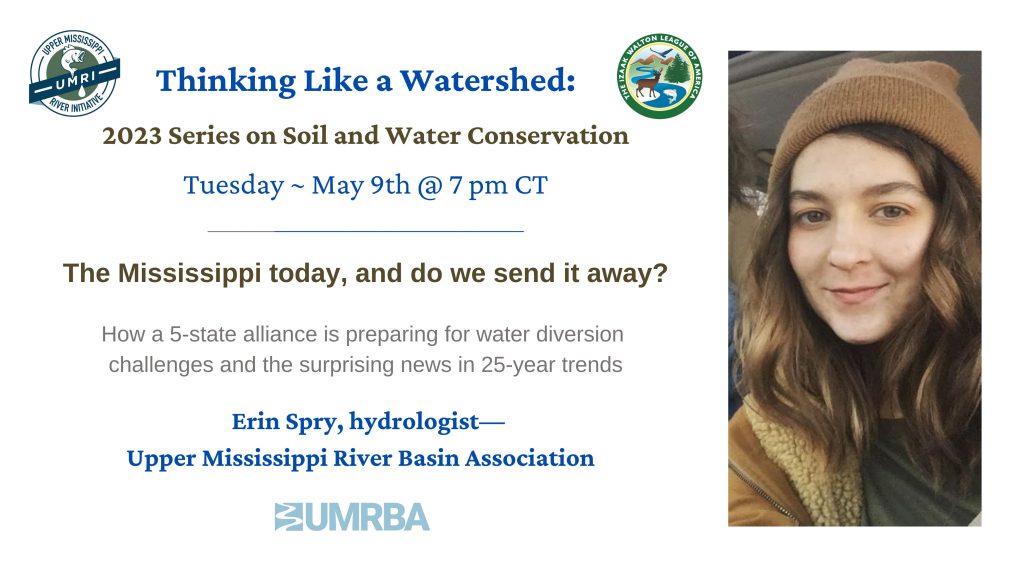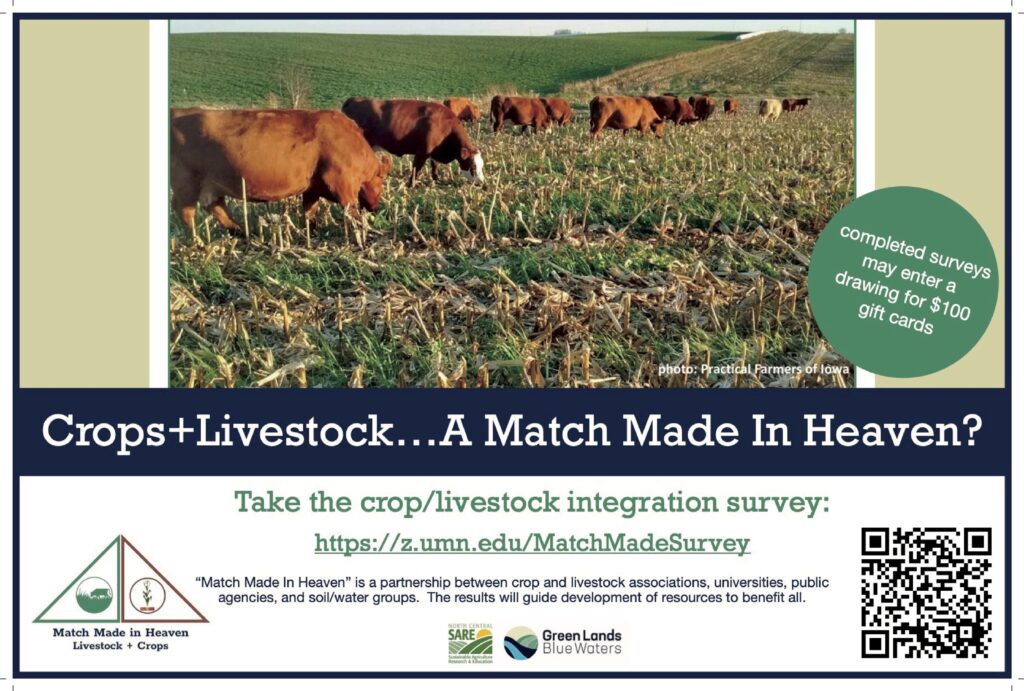But first!
Top of page for deadlines, with details below. Read on for how to act on your priorities:
➢ May 9, 2023 at 7 p.m. – “The Mississippi today, and do we send it away?” See below to register for this month’s “Thinking Like a Watershed” webinar series.
➢ May 20, 2023 at 9 a.m. – Save Our Streams (SOS) streamside training. See below for how to save your spot.
➢ May 22, 2023 at 6 p.m. – Water forum in Lewiston, MN to address nitrate contamination and karst, health, recreation, and trout fishing. See below for details on this free education program.
➢ We need 10,000 farmers and landowners to tell us stuff about crops and livestock. See below for survey details and how to take it yourself.

“Thinking” addresses Mississippi River water diversion and land use considerations
Our May 9, 2023 “Thinking Like a Watershed” webinar series takes on the rumors and threats of diverting water from the Mississippi to points west, and how we might consider water quality before we decide whether to share it.
Join us via Zoom…Tuesday, May 9, 2023 @ 7 pm CT
Register Here!
“The Mississippi today, and do we send it away?”
How a 5-state alliance is preparing for water diversion challenges and the surprising news in 25-year trends.
Erin Spry— hydrologist, Upper Mississippi River Basin Association
The Upper Mississippi River Basin Association (UMRBA) was established in 1981 as a forum for interstate cooperation and eight years later, the five states of the association (Iowa, Illinois, Minnesota, Missouri, and Wisconsin) created a charter to conserve the water resources of the Basin. With anticipated demands for Mississippi River water on the horizon, its board now wants an update: an Impacts Assessment that includes a water budget of the river, current water uses and diversions, and water availability, for starters. This would, in practice, help Upper Mississippi River Basin states understand the impacts of individual state water diversion decisions while strengthening the agreement of the states within the Charter.
Informing this scoping work are the recent outcomes of a nearly-30-year assessment of select hydrological and ecological health markers on the Upper Miss. Results include widespread changes in fish communities and precipitation patterns, a decreasing floodplain forest area, and even some good news about water quality. This is the present tense background that Hydrologist Erin Spry of the UMRBA will discuss before circling back to describe what she hopes becomes a timely response to rumors and realities of water diversion.
This monthly series is a project of the Upper Mississippi River Initiative (UMRI) of the Izaak Walton League of America, with co-hosts Christine Curry of UMRI, Chris Henning of the Panora Conservation Chapter, and Des Moines Chapter Communication Director, Bud Hartley. We feature guests for 30-40 minute presentations that shed daylight on good works done in the name of the Mississippi and its uplands. In this way we uplift our shared goals for a cleaner river, a cared for environment, and kinder communities. Recorded programs are available at UMRI’s resource page shortly after they air live.
“Thinking” recordings
The recording to the April program is available now: “Local Heroes in Howard County Revisited!”: Thinking Like a Watershed ~ Neal Hunter and Hunter Slifka, Watershed Coordinators, Howard County SWCD – Apr 11, 2023 How they have continued to incorporate the highest percentage of acres under conservation practices in the state of Iowa.
The recording to the March program is available now: “Crops + Livestock…a Match Made in Heaven”: Thinking Like a Watershed ~ Denise Schwab and Caroline van Schaik – Mar 12, 2023 How re-integrating livestock and cropping systems is a marriage for soil health, climate change, and happy farmers – no blind date needed.
The recording to February’s program is available now: “The Green Amendment Movement as a Path to Environmental Health”: Thinking Like a Watershed with Maya K. van Rossum – Feb. 14, 2023 How the Green Amendment movement is incorporating constitutional rights at the state level to codify a healthy environment, with Maya van Rossum, Founder, Green Amendment for the Generations.
Streamside training May 20
UMRI in the Driftless region of Minnesota will host a Save Our Streams (SOS) training workshop on Saturday, May 20, 2023 at St. Mary’s University in Winona with certified trainer, Dr. Jenny Biederman. Please contact Caroline van Schaik to save your spot.
It’s going to be a good day (9 a.m. to 2 p.m.) of indoor and streamside training that will get you most of the way to SOS certification. Thanks to a grant from the IWLA Endowment Board to the Winona Will Dilg chapter of IWLA, the workshop is free. Bring lunch if cafeteria fare is not to your liking, plus mud boots or waders if you want to be in the water as opposed to beside it.
In the meantime, you can do some on-line homework by way of preparation at Save Our Streams, though it is not at all required. The SOS program, begun 51 years ago, is a national effort by the Izaak Walton League to engage volunteers across the country in collecting data according to standard protocols. Chemical and biological data are uploaded to a searchable hub and are used at the federal level to inform water policy and practices. The data also are serving as talking points in communities working for safer water. Minnesota’s Austin chapter is a case in point, applying their data results to successfully help close county septic system loopholes. Stream team volunteers in Winona County are establishing sampling sites along Rush Creek with an eye to addressing recurring fish kills.
Water Forum on Nitrate Contamination in Lewiston, MN on May 22
Water contamination in karst and corn country is not new and it has additional twists in Winona County because of Driftless geology. Come learn why the Jordan aquifer west of St. Charles gives up different quality water than when heading east, and most important, why the health and economical consequences need attention. The program is free and starts at 6 p.m. Details are in the press release below with background in an article detailing the July 2022 fish kill in the region and this link to the just filed request for EPA intervention.
LEWISTON, MN
4/25/2023 – The dire impact of nitrate-contaminated drinking water on human health and regional economics is the focus of a forum on Monday, May 22, 2023, from 6 p.m. to 7:30 p.m. at the Lewiston Community Center, 75 Rice St. in Lewiston. The League of Women Voters is facilitating the program, which is free and open to all.
The program is in response to recent well testing programs that confirmed significant nitrate contamination of rural drinking water. The Winona County Clean Water Coalition is organizing it with the Minnesota Well Owners Organization (MNWOO), League of Women Voters/Winona County (LWV), Izaak Walton League/Winona Will Dilg chapter, Trout Unlimited (TU), and Land Stewardship Project (LSP).
Speakers will address the role of karst topography in private well water quality, impaired municipal water sources, water contamination and human health, and the economic driver of clean water in the county and beyond. Confirmed speakers include Paul Wotzka, MNWOO; Aleta Borud, retired Mayo physician; Monta Hayner, Driftless Fly Fishing Co.; and Lee Stoe, trout fisherman and longtime TU member. The program will include brief presentations and facilitated Q&A along with information tables.
Inspiring story of grazing
The director of a kindred organization based in Wisconsin, Dairy Grazing Apprenticeship, was awarded that state’s Leopold Conservation Award. Joe and Christy Tomadl’s life long efforts to advocate for and practice managed dairy grazing has led to a myriad of positive consequences, and not just on their home farm. The video of their story is worth a view for the inspiration it provides.

10,000 farmers/landowners
UMRI is part of a multi-state effort to talk forthrightly about cropland, livestock, and the matchmaking that would put soil and farmers alike in a healthier state. That in turn helps public waters, habitat, rural economy, roads, and wildlife be more resilient against weather, climate, and global everything. If the integration of crops and livestock brings benefits, we also acknowledge the challenges. We’ve spent months and many difficult conversations assembling questions whose answers we hope provide direction to more useful technical help, workshops, research, financial options etc. This is a 10-15 exercise, not your ordinary questionnaire, and yes, that WQR code works. The survey is also here.
“Match Made in Heaven” is a partnership between crop and livestock associations, universities, public agencies, and soil/water groups. The results will guide development of resources to benefit farmers, landowners, and the public at large who bear the consequences of farming beyond the farm gate. For more details on the initiative, please see Green Lands Blue Waters/Midwest Perennial Forage Working Group
Please contact Caroline van Schaik for help in disseminating it to your constituents. We’d be more than appreciative to have your help, and in fact, we have some grant dollars to help you do so.
If you are a farmer or landowner, use the QR code or the link to take this survey yourself and then pass it on. We want answers from 10,000 farmers and non-operating landowners on their specific challenges to integrating crops and livestock. What do they see as the benefits? Is this “marriage” already ongoing on their farm? How does it work, why doesn’t it, and what else should we know?

